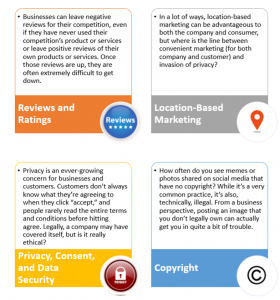Module 3: Readings and Videos Part IV

Overview
There are several ways in which digital marketing can provide an ethical quagmire to businesses. There is a fine line to walk between what’s required by your company’s shareholders (i.e., the need to make a profit!) and what’s ethical or right, as it pertains to your customers and clients. This part of the module, you will learn about some of the key potentially challenging ethical decisions companies may need to make about their marketing and how to make those tough ethical decisions. You will research both blatant and gray areas of digital marketing bad behavior dealing with reviews, privacy, security, copyrighting, etc.
Module Objectives
Upon completion of this part of the module, you should be able to:
- Analyze and discuss ethical challenges that are problems in the digital world.
- Describe how certain ethical theories could be applied to digital marketing.
- Consider and assess ethical decisions marketers may make for a business
Readings and Research
Watch
- One of the two Fyre Festival Documentaries: “Fyre Fraud” (Hulu) or “Fyre: The Greatest Party that Never Happened” (Netflix)
Read
- Jacobson, Jenna, et al. “Social Media Marketing: Who Is Watching the Watchers?” Journal of Retailing and Consumer Services, vol. 53, 2020, doi:10.1016/j.jretconser.2019.03.001.
- The Guardian, “Fighting Fyre with Fyre: the story of two warring festival documentaries” by Adrian Horton
- JumpSix Digital Marketing, “Ethical Issues in Digital Marketing“
- PR News, “PR Pros See Ethics Becoming Even More Important in 2020” by Seth Arenstein
There are some intrinsic ways in which both marketing and buyer behavior have changed through the influence of technology and the online environment. While providing unique and exciting benefits for marketers, the world of digital marketing is also ever-changing. Sometimes it can be hard to keep track of changes in technology and behaviors and to know where to find reliable sources of information.
Here are some suggestions for recognizing expert resources:
- The article or study should be dated within the last 12 months, maximum.
- The author of your research should be either scholarly in nature or a neutral, recognized industry expert. Businesses will often post blogs that seem to be written by experts, however, they are trying to sell their products or services, so their neutrality is not guaranteed.
Some examples of reputable neutral sources may include:
- Neutral publishers, such as Inc., Business Week, Entrepreneur, etc. These will not be scholarly in nature but may present opinions and ideas that spark discussions.
- Scholarly articles published at universities or similar think tanks
- Expert online marketing sites that are not actively attempting to sell you their services, such as Hubspot or Moz.com.
Ethics in Digital Marketing
How do you define what may or may not be ethical in digital marketing? If people willingly give you their personal information and don’t unselect the box that says it’s okay to share that info, that means it’s okay to share it, right? What if you never asked their permission, so they never explicitly said no. Is it okay to share their information then? How about if you get paid by advertisers that are related to what they purchased. You’re being pressured to make a profit from your shareholders, and this is one way you can do that fairly easily. You already have all the information, and the companies you’d be selling it to already sell something your customers would be interested. Win-win, right?
Making ethical choices in digital marketing can be a challenge, not only because you have conflicting priorities between your shareholders and clients, but also because sometimes it’s hard to interpret whether there’s an ethical issue or not.
For example, the subject of marketing to children comes up fairly frequently. Children do not purchase products on their own, but they’re a major target market for toy, food, and clothing companies. Is it ethical to market to children? How do you decide? The companies have to make money, and by marketing to children they are not only reaching both children and their parents, but they are also potentially acquiring a long-term customer. And the child gets what they want, so it all seems great. But what if the company doing the marketing is selling a product that’s harmful to children, like sugary foods or sexualized clothing? Is it still ethical then? And, if not, who should be the regulator of ethics? Who should make decisions on what is ethical or not?
Whether your company is B2B, B2C, or a non-profit, here are several different areas in which ethical decision-making plays an important role in digital marketing. Described below are just a few.

Dealing with Ethical Gray Areas
Sometimes an activity may be perfectly legal but still falls into an ethical gray area, as described below.
One example of this is “clickbait.” Clickbait is using a leading headline (“This pregnant woman thought she was having a healthy baby boy. What happened next is too surprising for words!”) to get people to click on a link, but then sending them to a misleading link. Clickbait gives websites additional traffic, which enables them to charge more to advertisers. In this interview with New York Magazine, Jon Stewart described Clickbait, saying “When I look at the Internet, I feel the same as when I’m walking through Coney Island. It’s like carnival barkers, and they all sit out there and go, “Come on in here and see a three-legged man!” So you walk in and it’s a guy with a crutch.”
Further examples of ethical gray areas in marketing include deceptive advertising, misleading research, encouraging materialism, invading consumer privacy, not disclosing safety issues, and not being sincere about their efforts, as Professor Wolters describes in the video below.
Review this Ethical Theory Overview for further information.
Influencer Marketing
What exactly is influencer marketing? The following video discusses what an influencer actually does and how influencer marketing works.
And in this video, Neil Patel discusses how marketers can leverage influencer marketing.
Sounds pretty great, right? It’s a powerful marketing tactic, for sure! But social media influencers have been under the spotlight for the past few years, as some of the darker aspects of influence come to light. With the release of two documentaries on the catastrophe that was Fyre Festival (one on Netflix, one on Hulu), even people who don’t follow influencers are now aware that they exist and that they can potentially be problematic.
This news video talks about Fyre Festival and the role of influencers:
Every day, Instagram influencers are “coming out,” describing the profession (and it is a profession now) as fatiguing and fake. People are more aware that influencers are paid by brands, but there is always still a question of transparency and whether it is ethical for influencers to be paid to influence people to make purchasing decisions. There is little to no regulation on influencers, and there has been some debate on how much transparency should be required. We are trained to recognize product placement in television shows or movies, but influencers are still new enough that this response isn’t a given yet.
The video, “Is There a Dark Side to Social Media Influencers,” presents a global conversation about social media influencers and their responsibility to their followers or audience.
Privacy
As we’ve discussed earlier in this course, target marketing is a necessary part of digital marketing. You need to understand your customer to reach them and interest them. But where does target marketing go too far? We’ve seen several major data breaches over the last several years, including Target, Home Depot, and Facebook.
Example
This debate over encryption and “back doors” is still going on today, as seen in the New York Times’ article, “F.B.I. Asks Apple to Help Unlock Two iPhones,” by Jack Nicas and Katie Benner.
This final video is extremely important for your final digital marketing plan. Take notes on this video and just down any questions you have as you are watching: KPIs for Digital Marketing | How to Evaluate Your Marketing Performance:

